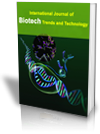Abscissic acid (ABA) hormone causes plant and tissue growth inhibition: Prospect for cancer cell growth inhibition
Citation
A.B.M. Sharif Hossain, Musamm M. Uddin "Abscissic acid (ABA) hormone causes plant and tissue growth inhibition: Prospect for cancer cell growth inhibition", International Journal of Biotech Trends and Technology (IJBTT), V7(4): 18-21 Oct - Dec 2017, Published by Seventh Sense Research Group.
Abstract
The experiment was conducted to evaluate the inhibitory effects of abscissic acid (ABA) on the peach shoot and bark phloem tissue growth. The results of the hormonal effects [abscissic acid (ABA)] showed the study on the peach shoot and phloem tissue and prospect of the inhibition of cancer cell division and multiplication. The result presented using peach shoot and bark phloem tissue growth inhibition applying the hormonal application of ABA at different concentrations. The result observed the highest shoot (74.6% at ABA 2000ppm) and bark phloem tissue (100% at ABA 2000ppm) were excessively inhibited. From the results indication, it can be concluded that it is excessively possible to inhibit of the growth of plant shoot and bark tissue by affecting cell division and cell differentiation using ABA and the highest plant tissue growth was inhibited 100% at 2000ppm ABA. So, from our results, it can obviously be prospected that ABA at different concentrations can be effectively inhibited the human cancer cell growth.
References
[1] S. Joseph. Genetically modified seedless fruit. April 23, 2013. http://www.buzzle.com/articles/genetically-modified-seedless-fruits.html.
[2] A.B.M.S. Hossain, F. Mizutani, J.M. Onguso, A.R., AlShereif, H. Yamada. Inhibiting peach-trees growth with Abscisic acid, hinokitiol, and tropolone applied to partially ringed bark strips. Journal of the Horticultural Science and Biotechnology, 82:175-178. 2007.
[3] S Lev-Yundan and R. Sederoff Grafting for transgenic containment. Nature Biotechnology.19,1104. 2001.
[4] A.B.M.S. Hossain, F. Mizutani. Growth regulatory effect of cytokinin in peach trees as affected by ringed bark strip by using bioassay in vitro. Canadian Journal of Pure and Applied Sciences. 3 (1), 655-659. 2009.
[5] R.B. Austin, I.E. Henson, S.A. Quarrie. Abscisic acid and drought resistance in wheat, millet, and rice. In Drought Resistance in Crops with Emphasis on Rice, M.R. Vega, ed. (Los Banos, The Philippines: lnternational Rice Research Institute), pp171 -180.1982.
[6] I.E. Henson. Effects of atmospheric humidity on abscisic acid accumulation and water status in leaves of rice (Oryza sativa L.). Ann. Bot.1984; 54, 569-582.
[7] J. Baker, C. Steele, L. Dure. Sequence and characterization of 6 Lea proteins and their genes from cotton. Plant MOI. Biol. 11,277-291. 1988.
[8] J.A. Napier J.M. Chapman, M. Black. Calciumdependent induction of nove1 proteins by abscisic acid in wheat aleurone tissue of different developmental stages. Planta, 179. 1989.
[9] R.M. Gonzalo. Abscissic acid against cancer. Patent No. US8389024 B2. 2014.
[10] Y. Marco. Biological control of bacterial wilt in Arabidopsis thaliana involves abscissic acid signaling. New Phytologist 194, 1035–1045. 2012.
[11] H.W. Zhao et al. Effect of induction of differentiation of TCA813 cells affected by abscissic acid in vitro. Hua Xi Yi Xue Za Zhi 25, 508-512. 2007.
[12] N. Zhou, Y. Yao, Y. Hongxing, Z. Wei, C. Liang, M. Ying. Abscisic-acid-induced cellular apoptosis and differentiation in glioma via the retinoid acid signaling pathway Molecular Cancer Biology. 138(8): 1947-1958. 2016.
[13] V.W.C. Livingston The conquest of cancer:Vaccines and diet. Franklinwatts, New York.NY. 1984.
Keywords
ABA, plant growth inhibition, cancer cell inhibition.


